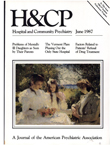Factors Related to Drug Treatment Refusal in a Forensic Hospital
Abstract
Using the hospital records of 421 patients in a maximum-security forensic hospital, the authors explored the relationship between clinical factors and patients' receptiveness to or refusal of drug treatment. They found drug treatment refusal to be significantly related to a psychotic diagnosis in the absence of a personality disorder; in contrast, psychotic patients with personality disorders tended to be relatively compliant with drug treatment. Treatment refusers had significantly longer lengths of hospitalization that were not reduced by receipt of medication. Significant relationships were also found between treatment refusal and involuntary medication, use of restraints, and greater number of previous hospitalizations; between reasons for refusal and involuntary medication; and between history of substance abuse and previous incarceration.
Access content
To read the fulltext, please use one of the options below to sign in or purchase access.- Personal login
- Institutional Login
- Sign in via OpenAthens
- Register for access
-
Please login/register if you wish to pair your device and check access availability.
Not a subscriber?
PsychiatryOnline subscription options offer access to the DSM-5 library, books, journals, CME, and patient resources. This all-in-one virtual library provides psychiatrists and mental health professionals with key resources for diagnosis, treatment, research, and professional development.
Need more help? PsychiatryOnline Customer Service may be reached by emailing [email protected] or by calling 800-368-5777 (in the U.S.) or 703-907-7322 (outside the U.S.).



